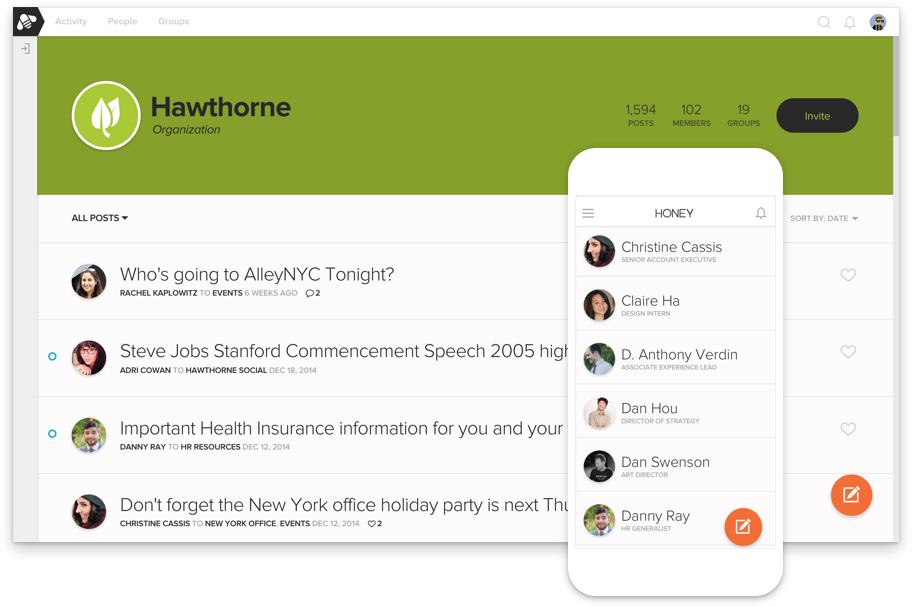Honey is the new easy-to-use company communications tool/social intranet built to connect global teams, share internal resources, simplify team conversations, and support employee workflows, to keep everyone in the company connected, communicating, and on the same page – beautifully. Honey makes it easy for anyone in a company, from the intern to the CEO, to share useful links, inspiring videos, reference documents, clever ideas and internal news with their colleagues, without cluttering email inboxes.
And it’s a winner! Honey is being used – and loved and appreciated – by customers of all kinds, from multinational marketing and advertising agencies, to fast-growing tech companies, and a number of Fortune 500 teams.
Founder and CEO Rachel Kaplowitz tells us about this reimagined corporate intranet that’s got companies talking.
Who were your investors and how much did you raise?
We have raised $1 million in total from Point Nine Capital. This is our seed round and the first time that we have raised outside capital.
Tell us about your service.
Honey combines the best features of social platforms found outside the workplace with the security and structure of an enterprise intranet, to create better informed and connected companies. Companies use Honey to manage internal communications, bring transparency to the organization, drive and quantify employee engagement, and replace outdated intranets. Key features of the product include a user-friendly design, customizable groups, automated email newsletters, and a suite of administrative and analytics tools.
From a management perspective, communications teams or a CEO can post an announcement or start a conversation on Honey and ensure that it’s seen. For example, a media agency recently used Honey to host a Reddit-styled AMA to introduce their new CEO to the global team. It was a huge success, and employees especially appreciated having direct access to company leadership.
From an employee perspective, Honey allows anybody at any level of the company to start conversations around ideas or interests that they want to explore with their colleagues.
What inspired you to start the company?
We started Honey when we were employees at the digital and design agency, Huge. Ironically, Huge used to be a small company in Brooklyn, but today it’s about 1000 people in 12 different offices around the world. As the company grew, they needed a communications tool to keep everybody in touch. All the existing tools in the space felt clunky and outdated. We wished there was something as simple to use as Reddit or Quora – but designed for work. It didn’t exist, so we decided to build it ourselves.

Sharing ideas with colleagues is ultimately more important to professional development than sharing with our social networks, and the fact that it doesn’t happen in most companies is a massive loss to both employers and employees. Honey changes that
How is it different?
Traditional enterprise intranets can be expensive and challenging to maintain, and depend on employees slugging through clunky technology to create content, which is why they’re never updated and never used. Honey approaches content-sharing like many consumer products do — simply. The platform gets out of the way, so that users can focus on the conversations they want to have.
The opportunity that we’re tackling is a modern, intuitively-designed social intranet that supports internal communications, IT, and HR needs of a large organization, while also empowering all employees with the tools they need to interact with their team, engage with their company, and access important resources. Honey provides every employee with a voice and the means to communicate easily and effectively with colleagues, regardless of where they sit in the office or on the org chart.
We’ve also worked hard to differentiate ourselves from our competitors in two critical ways: by having a product commitment to superior UX design, and a business commitment to customer success. Whether designing a new feature to enable customizable workflows or playing consultant for a new customer who’s struggling with internal communications, our driving mission is to build a beautiful enterprise platform that people love to use.
What are coworkers most likely to share through the platform, that you’ve noticed so far?
Many of our customers are working to build a communications culture that’s rooted in transparency and democracy. In traditional work environments, many teams exist in parallel silos — they often sit next to each other in the office and on the org chart, but don’t actually share what they’re working on, what’s inspiring them, who they’re learning from, what’s making them love their jobs… For nearly all of our customers, Honey bridges the gap between vertical teams. Whether sharing announcements about completed projects or links, to emerging industry trends, our users share information that helps them function as a unified team and do great work.
How has being part of NY Venture Fellows helped you and your company?
NYCVF actually uses Honey to keep us connected between events! We are constantly asking each other questions about vendors, scaling our teams, and sharing networking opportunities with each other. I am lucky enough to have three wonderful mentors through the program – Jack Welde, CEO of Smartling, Chris Fenster, CEO of Propeller Industries, and Justin Hendrix, Executive Director of NYC Media Lab. They have been incredibly hands-on helping me think through everything from hiring plans to financial projections – and have introduced me to some really wonderful people in the industry. I can’t say enough wonderful things about NYCVF and the team that runs the program.
What market you are targeting and how big is it?
We have three main types of buyers – 1) agencies, 2) Fortune 500 companies, 3) fast-growing startups.
Our client list includes Capital One, Sesame Workshop, Lowe’s Home Improvement, and Coca-Cola Hellenic. We also work with a number of fast-growing startups like Olapic, Prezi, Lyft, Curalate, and the LererHippeau Ventures portfolio community.
What’s your business model?
We charge $4/user/month. Nice and simple. No hidden fees.
What was the funding process like?
Interesting. I did most of our fundraising during the 3rd trimester of my pregnancy. I got our term sheet three weeks before my due date. I was dealing with lawyers and paperwork from the delivery room – literally.
What are the biggest challenges that you faced while raising capital?
Getting on a flight to San Francisco at 31.5 weeks pregnant and shuttling back and forth between SF and Sandhill Road for pitches!
What factors about your business led your investors to write the check?
We’ll let them tell you:
“Honey’s product focus and the successful implementation with big companies impressed us since the first meeting. It’s very rare to see an enterprise product with so much employee engagement across various industries,” said Nicolas Wittenborn at Point Nine Capital. “We’re thrilled to have the team join the Point Nine family. Their mission to bring well designed, user-centric products to the enterprise is perfectly aligned with our vision and portfolio.”
What are the milestones you plan to achieve in the next six months?
We’ll be releasing a shiny new iOS app soon! Mobile is a big priority for us, and while our mobile web experience is great, our native apps will be getting a lot of love over the next few months.
We are also planning to scale our product, customer support, marketing and sales teams in the very near future – send us your resume!
What advice can you offer companies in New York that do not have a fresh injection of capital in the bank?
Find a mentor! Talking to people who have been through getting a company off the ground before will not only help you sleep better at night and help you run a better company. It will also lead to key introductions – for funding, hiring, sales, and learning. Aaron Shapiro (CEO of Huge), Daniel Chait (CEO of Greenhouse), Matt Straz (CEO of Namely), and Jon Lehr (Venture Director at Work-Bench/Founder of NYETM) have played instrumental roles in Honey’s growth and, on a personal note, my professional development.
Where do you see the company going now over the near term?
There is an exciting rethink of enterprise tools happening right now – Greenhouse for recruiting, Abacus for expenses, Namely for HR, and Slack for chat, to name a few. We see ourselves being a part of this trend of consumerization of workplace technology and are excited that so much of it is happening in NYC.
What’s your favorite NY bar, when you want to go hang with your coworkers?
Can we take a moment of silence for Rebar? Otherwise, anywhere that Pam Wiznitzer is working.





